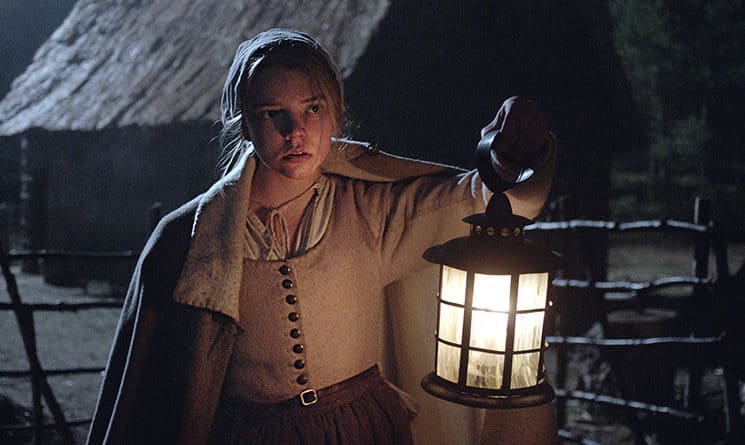Above: Anya Taylor-Joy stars as Thomasin in Robert Eggers’ new movie, “The Witch.”
2015, 90 minutes, rated R
by Larry Clow
The Witch,” the debut film from director Robert Eggers, is subtitled “A New England folktale.” It’s an interesting, precise bit of positioning in a film full of interesting, precise moments. Calling itself a folktale rather than, say, “the ultimate experience in grueling terror” (a tagline used to great effect by 1981’s “The Evil Dead”), casts “The Witch” not as a supernatural thriller, though it is that, but as a small slice of history that’s grown a little in the telling.
Eggers’ faithfulness to history, along with his uncanny knack for creating moments of unbearable tension and an unwavering commitment to good, honest scares, are just a few of the many high points in “The Witch.” Movies about witches, especially period pieces set in colonial New England, are so easy to get wrong, but “The Witch” succeeds through a careful, deliberate balancing act. There are no trade-offs — we get strong performances from the cast, immersive production design, a rich script, and plenty of grueling terror, none of which are sacrificed at the expense of others.
“The Witch” opens in 1630, some six decades before New England’s most famous witch trials occurred in Salem. An English family is banished from their plantation community and settles on the outskirts of an ominous forest. Father William (Ralph Ineson) attempts to farm, but the crops rot. Mother Katherine (Kate Dickie) is soon beside herself with grief when her infant son Sam vanishes mysteriously. Twin children Caleb and Mercy, too young to help with chores, spend their days frolicking with one of the goats, an evil-looking animal named Black Phillip.
The family’s misfortunes continue to pile up, and at the center of the disasters are the two oldest children, the teenaged Thomasin (Anya Taylor-Joy) and her adolescent brother Caleb (Harvey Scrimshaw). Thomasin becomes something of a scapegoat; her youngest siblings and mother both turn against her to various degrees. When she joins Caleb in a scheme to bring home some food — and the pelt of the wolf that the family believes made off with Sam — things get much worse, and it’s not long before the family turns against each other.
The supernatural accounts for plenty of the frights in the film, but more terrifying is watching a close-knit family unravel so quickly and so easily.
As a horror flick, “The Witch” is refreshing. The genre, like any other, has its share of tired tropes, and when it comes to movies about witches, there’s a tendency toward caricatures, bad puns, and winking self-awareness. “The Witch” plays it straight, which is remarkable in an era where every movie tries harder than the last to surprise its audience with an inane twist. Eggers begins with the premise that evil is a real, physical presence in the world and asks his characters, and the audience, how to deal with it.
Watching the characters grapple with that idea alone is compelling stuff. There are no stock characters in “The Witch.” As the parents, Ineson and Dickie bring a wealth of layers to William and Katherine, layers as complex and distinct as the fickle soil that starts the family’s troubles. Their performances are remarkable and empathetic — you may be inclined at first to distrust Puritan parents, but as “The Witch” progresses, it’s clear that William and Katherine do what they do out of love for each other and their children — and that it’s that love that ultimately dooms them.
The film’s real stars, though, are Taylor-Joy and Scrimshaw, who are given the difficult task of making life as a teenage colonist seem convincing and relatable. Thomasin and Caleb wrestle with their growing doubts about the path their family has taken and struggle with their changing bodies. Being a teenager is, under the best circumstances, immensely difficult, but in a solitary Puritan household where nearly everything is cast in the context of sin, it’s almost deadly. Taylor-Joy and Scrimshaw act the hell out of it all, expressing terror and doubt and joy and confusion all in the space of a few knowing glances.
The great performances and the rich subtext are all something of a bonus, though. “The Witch” is a fantastic, old-fashioned scary movie. The sound design is especially remarkable — the thud of an axe, the tinkling of wind chimes, and the bleating of a goat, all innocuous on their own, are absolutely portentous here. The supernatural accounts for plenty of the frights in the film, but more terrifying is watching a close-knit family unravel so quickly and so easily.
Eggers, a Seacoast native who grew up in Lee, based the script and production design on years of research. Many of the lines were lifted from diaries and other documents written at the time, and the film is suffused with a sort of melancholy that New Englanders will instantly recognize. Like the best folktales, “The Witch” has a pebble of truth at its core. The darkness in the woods is a reflection of the darkness in ourselves, Eggers argues — but only one can do us real harm.
“The Witch” opens in local theaters on Feb. 19.

